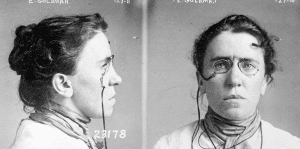
Emma Goldman’s mugshot
In the 1870s, a social purity movement led to the passage of the Comstock laws, which forbade the distribution of obscene materials through the US mail. Birth control information and devices were considered obscene materials.
Women of means could obtain birth control from their doctors, who were not restricted by Oregon law from dispensing birth control information and methods. However, in the first decades of the 20th century, birth control practices were looked down on by the establishment because they were thought to encourage immoral behavior. Most working class women were not able to afford doctor visits and consequently tended to have larger families. They were also more likely to turn to abortion as a last resort. In 1921, a Stanford University study reported that approximately one of out of every two pregnancies were terminated by abortion.
More women began to receive a medical education in the early 20th century. Emma Goldman and Margaret Sanger were both trained in nursing, and Marie Equi was trained as one of the first thirty women doctors in Oregon. All three women came from working class families, and their experiences providing medical treatment for poor women fostered their radical political thinking.
Goldman began visiting Portland, Oregon, to lecture in 1906 and returned almost every year. During her August 1915 visit, her speech was titled “How & Why Small Families Are Best” and she described various means of preventing pregnancy. She was arrested by city police, and C.E.S. Woods, well-known Portland attorney, poet, and painter, posted her bail. If that wasn’t controversy enough, the very next evening she gave a talk on “The Intermediate Sex: A Discussion of Homosexuality.” Both Goldman and Equi had engaged in intimate relationships with other women, and Equi was quite open about whom she was living with.
Following Goldman’s appearance in Portland, former socialists and wobblies, including Equi, formed the Portland Birth Control League. In June 1916, they supported Margaret Sanger’s visit to Portland, part of her national lecture tour promoting her birth control methods.
At her public lecture, three men were arrested for selling Sanger’s pamphlet Family Limitation. As the Portland police took the men away, Equi began handing out the pamphlets for free. Sanger and Equi went to the police station, and Sanger offered to take the arrested men’s place in jail, but the authorities refused. Equi posted their bail.
Sanger continued on her tour and returned later for the three men’s trial. While she was away and at her request, Equi revised the birth control pamphlet for her. A staunch opponent of America’s entry into World War I, Equi included in the pamphlet language encouraging women to control the birth of “human material for exploiters and militarists.”
As further evidence of these women’s radical thinking, Sanger wrote in the 1917 edition of Family Limitation: “It is only the workers who are ignorant of the knowledge of how to prevent bringing children in the world to fill jails and hospitals, factories and mills, insane asylums and premature graves. The working women can use direct action by refusing to supply the market with children to be exploited, by refusing to populate the earth with slaves.”
Sanger’s 1917 edition of Family Limitation is available on the Internet, and its 16 pages are well worth reading.
Toward the end of June 1916, Sanger returned to Portland and gave another lecture. This time she, Equi, and two other women were arrested. A hundred women from the audience marched to the police station in protest. The arrestees spent the night in jail. At a trial attended by a large crowd, the judge ordered suspended fines for the men arrested earlier and no fines for the women.
In August 1916, Goldman returned to Portland, and in a talk titled “Free & Forced Motherhood,” she discussed abortion. For this she spent a fortnight in jail.
While Goldman supported abortion in general, she did not use her nursing skills to perform such operations, which she easily could have done. Equi, on the other hand, was not outspoken in her support for abortion, but she quietly performed therapeutic abortions, a somewhat flexible term, as part of a holistic approach to women’s health. Throughout her long medical career, she encountered no legal problems because of these practices.
***
Read more about Pacific Northwest history in my novel Acquaintance. Buy the book HERE.
Web link:
Margaret Sanger’s Family Limitation, 1917:
https://archive.lib.msu.edu/DMC/AmRad/familylimitations.pdf
Other references:
Gordon, Linda. The Moral Property of Women: A History of Birth Control Politics in America, 2007. University of Illinois Press.
Helquist, Michael. Marie Equi: Radical Politics and Outlaw Passions, 2015. Oregon State University Press, pp. 134-136, 145-151.
Helquist, Michael. “Lewd, Obscene and Indecent: The 1916 Portland edition of Family Limitation,” 2016. Oregon Historical Quarterly, 117(2).
Photo: Emma Goldman’s mugshot from http://woodstockwhisperer.info/category/feminism/birth-control/
***
Recent Comments